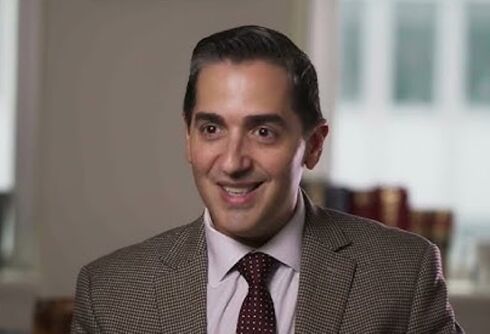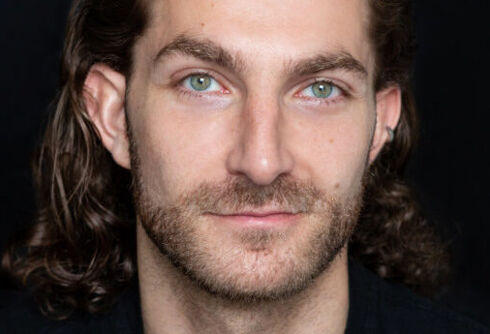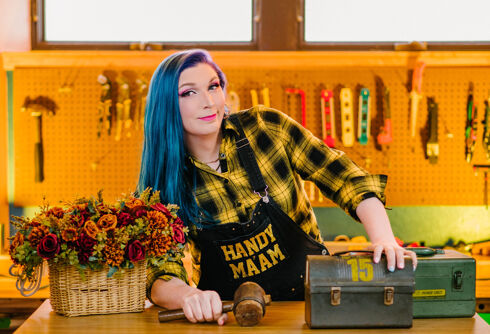Hailing from the city of love, Aline Laurent-Mayard is a journalist, author, actor, and podcaster. They have written for publications such as Le Monde and Slate, published two books about gender in pop culture, and most recently have been featured in season 12 of the French tv drama Skam France .
Aline is also the creator of the podcast series Free From Desire, which narrates their journey to discovering they are asexual, a journey laden with angst, trials, and tribulations. Noticing a lack of asexual content and media representation, Aline created the podcast in partnership with Paradiso Media to highlight the many different issues asexual people face in a hypersexualized world. Free From Desire has received rave reviews by many different outlets including Hollywood Reporter and Forbes, and it has received international recognition and distinction. Recently, it won the Best Narrative Nonfiction Audio Storytelling Award at the 2023 Tribeca Festival.
Related:
I’m about to turn 50 & I’m still single. Did I miss out on something really special?
“Overall, you’re satisfied with your life, and that’s the most important thing. Being in a relationship doesn’t always guarantee a more fulfilling life.”
I sat down with Aline to discuss their motivation behind creating Free From Desire and the need for good asexual representation in media.
Never Miss a Beat
Subscribe to our newsletter to stay ahead of the latest LGBTQ+ political news and insights.
LGBTQ Nation: I am so thrilled to have a podcast about asexuality, as an ace myself. What was the inspiration behind making the podcast?
Aline Laurent-Mayard: One of the reasons why it took me so long to come to terms with me being asexual is I had the wrong information from all the awful content being written about asexuality. I was like I need to clarify what these writers get wrong. So, I started to pitch articles and almost nobody wanted them. But the more comfortable I was being an asexual the more I wanted to dig deeper. For example, the fact that asexuals are more at risk of sexual violence. I was like, “Okay I need to check that. Why is there no actual investigation on that?” Almost no media wanted my stories. I was just frustrated. I was like, “Okay, I think the ace community (and the allo community) need more content.
I decided I’m going to use my story to show people that asexual people are not that different from them and that there is a lot to be gained by seeing asexuality as just another sexual orientation worth time and consideration.
LGBTQ Nation: Asexuality often gets lost in the shuffle in sex-positive circles. Most people in terms of sex positivity think it means having sex consensually with whoever you wish to have it with, but they don’t seem to have an ability to place asexuality into that discussion. Why do you think that is?
ALM: I think there are many, many reasons. First, early feminism was all about reclaiming our bodies and being able to have sex if we want to have sex. In the 60s and 70s, everything was like contraception, abortion, and all of that. I think, as usual with fights, we just went a little bit overboard and then we just took it to heart. That’s what I say in the podcast. For me, being a feminist was being sexually active because ten years ago before we had Me Too, feminism was fighting for abortion and contraception rights. So it was really sex-focused. There were also a lot of things about work, of course. However, to me, sex was one of the things that feminists had to do, especially coming from France.
There are some specificities to being French. and I think in France it’s all the more true — that feminism equals sex.
You have something called the patriarchy. When you look at what happened during the 70s for example, while women were trying to have a claim during the sexual revolution, it was actually very misogynistic. A lot of women were not realizing that they were being raped or forced. I mentioned rape culture in the podcast. As women, we are made to believe that we need to have sex to be a nice person. I think that’s very important to remember. We are in a culture where we are taught that women should be available for men at all times. Men think that their masculinity is measured by how much sex they have. That’s also in this podcast, even though I talk as a person socialized as a woman.
Also with the Christian church, we’ve had this pressure on us to have sex, to have kids and marriage. There still hangs above us who are assigned female at birth this obligation to have kids to preserve the nation, to grow the nation, to grow the church. Because of that, people have always been in our business and telling us how we’re supposed to have sex — not doing this, not doing that, not with that person, with this person instead. Though the rules changed in a way, we still remember the old rules, and we get so many contradictory rules that we get all messed up, and we don’t know what we’re supposed to have anymore. That confusion creates a lot of misunderstanding. So, I think the easiest way to react to that is just to hold on to one rule, and that one rule is let’s have sex because sex is cool.
LGBTQ Nation: One of the biggest takeaways from listening to earlier episodes is the framing of compulsory sexuality and how it influenced you in terms of behavior. In the podcast, you mentioned you were 23 and a virgin. Because of that, people were issuing statements to you trying to coax you into having sex. You then traveled across the world and ended up going to Montreal and meeting up with a person with whom you lost your virginity. Then, you tried sex a couple more times. However, you still found yourself uninterested in sex and you reported feeling broken and ashamed over it.
Can you explain what compulsory sexuality is, why it is so harmful, and what a society free of compulsory sexuality would look like to you?
ALM: It would be lovely, a really great place to live. To me, we just need to get rid of everything that is compulsory. We need to give space for people to investigate what they want and to make sure that everybody feels like they’re valid and that their choices and their wants are valid. I’m not saying we should stop talking about sex. I’m not saying that sex should disappear from TV. That is not what I’m trying to say with that podcast. I’m just trying to say that I think there are a lot of people who have sex when they don’t want to have sex, who feel like they should want more sex just because society tells them they should. Right now, we just see the people who want a lot of sex, and we don’t see the people who don’t want a lot of sex. There should be representation in the media for people of all stripes. Why always assume that somebody is straight? We need to make more space for not assuming that everybody wants like us, not assuming that everybody is a straight, allosexual person.
LGBTQ Nation: You mentioned your battle with internalized acephobia on the podcast, where you felt like you were falling behind your peers because you hadn’t had sex yet. How did you break free of that internalized acephobia?
ALM: I think what’s interesting is that I didn’t have that much internalized acephobia when I was younger. I remember when I was in junior high I just didn’t care. I thought I was weird but not specifically for the ace part. The internalized acephobia grew as I grew older because of the repetition of people telling me “This is not normal!”, “You should want sex now!”, “You’re not cool!” The exclusion from some people, the false looks and all of that. And mostly people were telling me that I was how do I say it…
LGBTQ Nation: just missing the point of life?
ALM: Yeah.
LGBTQ Nation: What has the reaction been to Free From Desire, especially now that it has received international recognition? We’ve seen podcasts turn into mini-series or sitcoms. Do you think that could happen with yours?
ALM: The response in the media in France has been really interesting because I was trying to pitch articles about asexuality and nobody wanted them. Then, we did that podcast, and suddenly all the media were interested in asexuality. I was on the cover of magazines, I was on TV. Suddenly asexuality, not necessarily me and my work, was the topic of conversation, which is exactly what I was hoping for, you know?
I think that is a big reason why Free From Desire is powerful. Because it was not just one article with like one quote. It was one person sharing their story. I think they just needed something to start the conversation.
The podcast has been released for a year and a half by now in France. I still receive messages constantly from people of all ages. It’s completely insane. It’s really great to see that even after all this time.
As for the future, we’ll see how far it goes. Definitely, we want to push it further.
LGBTQ Nation: You also have a toddler, and that’s a rather novel concept for a lot of people. There’s not a lot of discussion around asexual people and marriage, family, and partnerships. Why do you think people struggle with accepting that asexual people can have families and children?
ALM: I don’t think people have a problem with it so much that they just have never thought of it. Even though we have more and more representation of LGBTQ+ families, which have always existed, people still see family = copulation. So people just assume asexual = no sex = no baby.
One of the reasons I really wanted to talk about it is that when I interview young aces, they often tell me, I’m just sad because I’m not going to have kids. I’m like, “No, there are a lot of infertile people, and they still have kids.” That’s not the way it works. You can adopt, you can use medical help to have kids. There are so many ways to make a family, to make kin. It’s just really weird that because of compulsory heterosexuality, we’re still seeing family as two parents having sex.
LGBTQ Nation: What advice would you would give content creators looking to create great asexual representation?
ALM: Oh, that’s so interesting. I think we still need many more coming out stories. I think we’ve seen a few, especially in teen shows. I think there’s room for so many more stories, especially with adults. I often get emails from elderly people, people in their 60s and 70s, who have come to realize they are asexual with help from my podcast. It’s a big deal to come to realize you’re asexual as an adult.
But one of the things I’m really interested in is what happens after coming out. We do exist outside of our coming out, and our lives usually don’t look exactly like straight cis straight people’s lives. So I think it’d be interesting to have a main character that is ace and that continues to exist after coming out and coming to terms with being an ace.
I do think we need more aroace (aromantic asexual) characters, though. Media always portrays ace people as looking to be in love with someone, wanting to be in a relationship. Aromantic asexual people are also a representation that’s really lacking. We need to think of how to make aroace characters exist to show how one can live a life without sex or romance and still be happy.
so what does their life look like and how is it as valid and as valued as other people’s lives? There are so many things to explore if we actually paid attention to how people on the asexual spectrum live, as well as those on the aromantic spectrum.
My advice to ace creators: Go for it. When you create a character, when you create a story, you want something new, something fresh that will draw people in. And this is what people don’t know about our lives.
We’re the hot new thing. So just focus on our lives. Really open your eyes. Look at Alice Oseman showing us the way. Alice Oseman is creating content and including asexuality more and more in their work, and I think that’s amazing. I can’t wait to see season 2 of Heartstopper because as far as I know, I don’t think any other ace creator has created something that large, with such a big audience. We’ve created small things here and there, but nothing really that got a large audience. So if Alice Osman has done it, it means that we can do it. The doors are becoming more open. So, we should just go and tell our stories. I know it’s hard, with how little writers are paid, with streamers just cutting and canceling a lot of shows, but we should go for it.
To go back to your point, I hear people saying things like, “Oh, but only ace people are going to be interested in a story without sex!”
First off, there are a lot of shows without sex. Disney Channel is without sex. Disney creates interesting stories without sex, you know what I mean?
There are a lot of people who are fed up with the pressure to have sex, fed up with compulsory sexuality, and it’s hurting them. It’s hurting everybody because then you’re forcing yourself to have the sex life that you think you should have with your partner instead of the sex life that both of you want. We as a society are just telling everyone that sex is something expected of you, something you have to do to be a valid person or an official couple, instead of opening a space for people to have frank and honest discussions about whether they would even want to have sex at all.
So I think having shows where the main characters don’t have to compare themselves with other people having sex, going on and on about how this couple is in a bad situation because they don’t have sex, and the show sends them to the psychologist. Yesterday, I was watching Tiny Beautiful Things, which is an amazing show. Once again, however, it’s a shrink telling a couple they should be having sex. Literally, it’s one of the pieces of advice the psychologist gives—go have sex. They end up not having sex, which I really enjoyed. They were just like, “oh, we’re going to get drunk!”, and I was like, “good for you.”
But yeah, everybody would gain from shows that are less focused on sex or that highlight the harms behind the concept of compulsory sexuality. Everybody will just be so much lighter if we stop putting so much pressure on ourselves to have a certain type of sex life. There’s no problem with having sex in a show, but let’s not frame it as something that’s necessary for a healthy relationship, necessary for happiness. It doesn’t have to be that way.
LGBTQ Nation: What do you want to say to the asexual person who listens to your podcast and discovers they are asexual thanks to you? What do you want them to learn, or what would you want to say to them as a message?
ALM: Happiness doesn’t come from sex. I know this is very Jean Milburn of Sex Education for me, but we need to stop thinking that sex is the only thing that makes you happy, and therefore if you don’t have sex, you’re not happy. Because when we say that, when we say to people that they’re missing out if they don’t have sex, you’re telling them that you cannot be happy without sex. Of course you can be happy without sex!
You can be in a relationship without sex. You can be happy without being in a relationship if that’s what you want. There are so many ways to be happy and we don’t have to fit in this tiny box that society is trying to sell us — a box that doesn’t even exist! How many couples have sex regularly? Not that many, especially if you have kids. So many people just can’t have sex physically. So many people just don’t care about it. There are so many reasons why people don’t have sex and that does not make them less happy than other people. There are ways to find your happiness outside of the box.
Don't forget to share:















